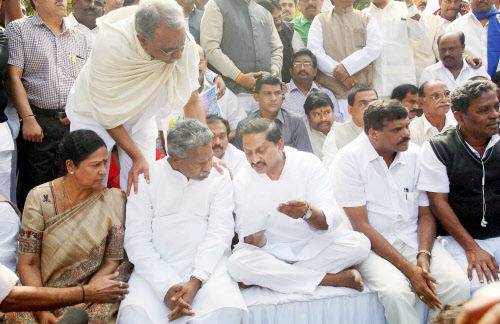 New Delhi, Feb 6: The drama over the formation of Telangana scaled new heights on Wednesday with Andhra Pradesh chief minister Kiran Reddy staging a sit-in protest in the Capital while a harried government weighed the option of a voice vote to pass the contentious legislation.
New Delhi, Feb 6: The drama over the formation of Telangana scaled new heights on Wednesday with Andhra Pradesh chief minister Kiran Reddy staging a sit-in protest in the Capital while a harried government weighed the option of a voice vote to pass the contentious legislation.
The CM doing an Arvind Kejriwal at Jantar Mantar seemed even more bizarre as Reddy was opposing his own Congress party's decision to form Telangana.
The task of getting the Andhra Pradesh Reorganization Bill through Parliament looks more challenging as Reddy set an unusual precedent by leading the anti-Telangana stir even as Congress pledged support to the new state.
While Reddy and some of his cabinet colleagues protested, Seemandhra MPs from Congress, YSR Congress and TDP disrupted Parliament, forcing adjournment of Lok Sabha followed by Rajya Sabha.
It is learnt that Telangana Rashtra Samithi leader K Chandrasekhar Rao has urged the government to pass the bill by a voice vote, arguing that bills to create Uttarakhand and Jharkhand were passed in a similar manner.
Government sources said the voice vote route could be an option as the Telangana bill is not a constitutional amendment, but senior Congress leaders remain cautious, pointing to vehement opposition to the new state.
However, the political directive to Congress floor managers is clear enough. "The next Lok Sabha will have 17 MPs from Telangana and 25 MPs from Seemandhra, the die seems cast," said a minister.
The bill is expected to be cleared by the Union Cabinet on Thursday with a group of ministers having finalized a draft.
BJP reiterated that it will oppose marshalling out of anti-Telangana MPs and also demanded that the two Houses must be in order when the bill is considered, conditions that Congress felt were aimed at delaying the bill.
Meanwhile, TDP leader N Chandrababu also reached the capital to oppose the Centre's "unilateral" decision to create a new state without adequate consensus. "The Centre must take the states into confidence. But the Centre is violating all this and that is not correct," he said.
Official sources said a TDP delegation led by Lok Sabha MP Nama Nageshwar Rao expressed readiness to support the bill. Rao represents TDP MPs from Telangana region.
With the government planning to bring the Telangana bill to Parliament, possibly Rajya Sabha first, on February 12, emotions are coming to a boil with supporters of both camps coming close to blows at Andhra Bhawan on Wednesday.
The heated exchanges between Telangana and Seemandhra MPs in Parliament also threaten to spill out of hand forcing the government to consider tough action like seeking the suspension of anti-Telangana MPs.
Though government managers are cagey in spelling out plans for disciplinary action, saying the matter is for presiding officers to decide, passing the bill in the presence of Seemandhra MPs seems a rather fraught task.
The noisy and chaotic start to the continuing winter session did not bode well for transaction of business and finance minister P Chidambaram admitted as much while addressing a business conclave, saying he doubted if Parliament will pass any law.
"We have to go through the ritual of attending Parliament every day and come back empty handed," Chidambaram said.
Prime Minister Manmohan Singh was more optimistic, saying "hiccups" over Telangana would subside. "I think these are hiccups. I hope all sections of the House will have the wisdom to set aside these prejudices and create an atmosphere conducive to harmonious working of the House," he said.
But the situation does not look promising for the government, as tough action like suspending anti-Seemandhra MPs will only increase the bitterness over the formation of Telangana.
While BJP is not making things easier for the government, the Congress will end up losing face on both sides of the Telangana divide if it backs out at this stage.





Comments
Add new comment